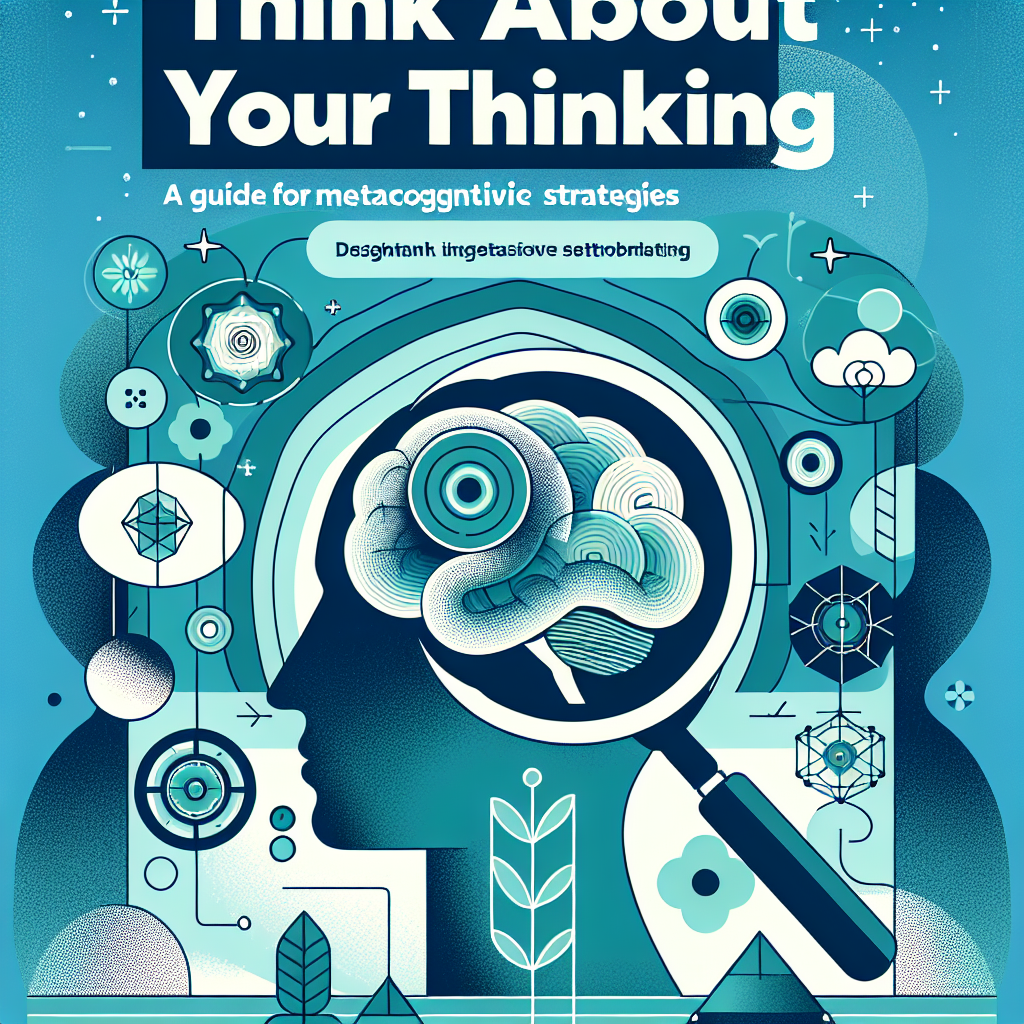Introduction
Have you ever felt stuck in a learning rut, unable to grasp a concept no matter how many times you read it? Or maybe you’ve studied hard for an exam and still felt unprepared? If so, you’re not alone. Many students and professionals struggle with effective learning strategies. The key might lie in a powerful practice often overlooked: metacognition. This article, "Think About Your Thinking: A Guide to Metacognitive Strategies," will delve into metacognition’s transformative power in enhancing our learning processes.
By considering not just the material we’re studying but also how we’re learning it, we can unlock doors to deeper comprehension and retention. So, buckle up as we navigate through the features of metacognitive strategies that can revolutionize your approach to learning.
Understanding Metacognition
What is Metacognition?
Metacognition refers to “thinking about thinking.” It encompasses two primary components: metacognitive knowledge (awareness of one’s cognitive processes) and metacognitive regulation (the ability to manage and direct those processes). According to psychologist John Flavell, metacognition involves:
- Knowledge of oneself as a learner
- Knowledge of strategies to learn
- Knowledge about the task at hand
Why is Metacognition Important?
Metacognition plays a crucial role in effective learning, problem-solving, and self-regulation. Research shows that metacognitive strategies lead to improved academic performance, heightened self-efficacy, and a greater ability to transfer skills across different contexts.
The Components of Metacognitive Strategies
Self-Monitoring: Assessing Your Understanding
Self-monitoring is the cornerstone of metacognitive strategies. It involves ongoing assessment of your understanding and performance. Here are a few methods to practice self-monitoring:
- Reflection Journals: Keeping a daily or weekly reflection journal can help identify strengths and weaknesses in your learning process.
- Think Aloud Protocols: Articulating your thought process while solving problems can clarify your understanding and reveal gaps.
Case Study Example: A group of college students implemented weekly reflection journals. Over a semester, they saw a significant increase in their test scores, demonstrating the power of self-monitoring.
Planning: Setting SMART Goals
Effective learning begins with solid planning. By setting Specific, Measurable, Achievable, Relevant, and Time-bound (SMART) goals, you can focus your efforts.
- Specific: Define clear objectives.
- Measurable: Determine how you’ll measure success.
- Achievable: Set realistic targets.
- Relevant: Ensure your goals align with your overall learning objectives.
- Time-bound: Establish a timeline for completion.
Regulation: Adjusting Strategies When Necessary
Regulation involves adjusting your strategies based on self-assessment. If a particular technique isn’t delivering results, it’s time to pivot.
- Seek Feedback: Regularly check in with peers or instructors for constructive feedback.
- Adapt Strategies: If flashcards aren’t working, consider visual aids or group discussions instead.
Case Study Example: A high school science class utilized peer feedback sessions to revisit their study strategies. The results showed improved understanding of complex subjects, supporting the effectiveness of regulatory practices.
Implementing Metacognitive Strategies
Step 1: Cultivating Self-Awareness
Start by cultivating self-awareness about your learning styles. Consider taking assessments to understand whether you’re a visual, auditory, or kinesthetic learner. Your chosen methods will significantly influence your metacognitive strategies.
Step 2: Develop Diagnostic Questions
Use questions to diagnose your understanding:
- What do I know about this topic?
- What strategies have worked for me in the past?
- What can I adjust to improve my understanding?
Step 3: Create a Metacognitive Toolkit
Assembling a toolkit of strategies can provide a solid foundation for learning. Consider including:
- Mind Maps: Visual representation of information.
- Summaries: Summarizing material in your own words.
- Practice Tests: Self-testing to reinforce knowledge.
Chart: Metacognitive Toolbox
| Strategy | Purpose | Example |
|---|---|---|
| Reflection Journals | Self-assessment | Weekly entries about learning progress |
| Mind Maps | Visual organization of ideas | Diagram of a chapter’s concepts |
| Practice Tests | Reinforcing knowledge through retrieval | Quizzes on key topics |
Enhancing Your Metacognitive Skills
Encourage a Growth Mindset
Adopt a growth mindset—believe that intelligence can be developed. This mindset encourages risk-taking in learning and resilience in the face of setbacks. By viewing challenges as opportunities, you can enhance your metacognitive practices.
Collaborate with Peers
Engage in study groups or peer collaborations. Explaining concepts to others and discussing different learning strategies can deepen your understanding and provide new insights.
Use Technology to Track Progress
Utilize apps or digital journals to log your learning journey. This digital tracking can help you visualize patterns in your study habits over time.
Conclusion
In the quest for learning success, the importance of metacognitive strategies cannot be overstated. By actively engaging in self-monitoring, planning, and regulation, you position yourself not only to learn more effectively but also to retain and apply that knowledge in diverse contexts.
As you think about your thinking, remember that awareness is the first step toward mastery. So, embark on this journey of metacognition and revolutionize your learning experience today!
FAQs
1. What are some easy metacognitive strategies for beginners?
Start with simple reflection journals, setting achievable goals, and practicing self-quizzing methods.
2. Can metacognitive strategies be applied in daily life?
Absolutely! Metacognition applies to everyday decision-making, problem-solving, and even relationships.
3. How do I know if my metacognitive strategies are effective?
Evaluate your understanding and progress regularly. If you notice improvement in your learning outcomes, your strategies are likely effective.
4. Is metacognition useful in professional settings?
Yes, metacognitive strategies can enhance learning and efficiency in the workplace, benefitting team dynamics and project management.
5. Are there specific resources for developing metacognitive skills?
Many online courses and educational materials focus on metacognitive strategies. Additionally, consider books on self-regulated learning and cognitive psychology for deeper insights.
By harnessing the power of reflection, planning, and strategic adjustment, "Think About Your Thinking: A Guide to Metacognitive Strategies" can empower individuals in their learning journeys, leading to profound personal and academic growth. Start today, and witness the difference!

